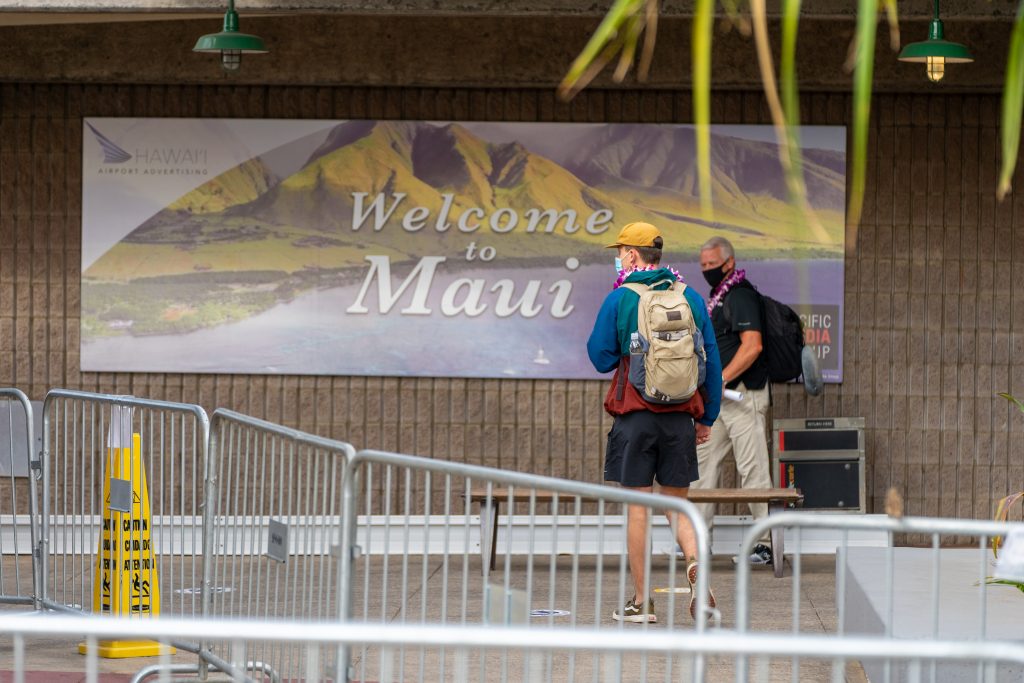Council mulls report outlining ways to manage tourism on Maui

Regulating peer-to-peer car sharing, setting a cap on tourist accommodations and banning transient vacation rentals in certain districts are among ideas to manage tourism on Maui that were presented this week by a county group.
Those recommendations and others are part of a 400-plus-page report unveiled Wednesday at the council’s Budget, Finance and Economic Development Committee meeting.
Derived by a temporary investigative group comprising four council members, the plans will be discussed for referral or other legislative action at the Feb. 23 committee meeting.
Members of the group included council Vice Chairwoman Keani Rawlins-Fernandez, Chairwoman Alice Lee and members Shane Sinenci and Tamara Paltin. They met with industry and community participants over the course of seven meetings starting last year.
Lee on Wednesday affirmed the hard work of the committee while saying she doesn’t agree with some of the recommendations.
“I didn’t agree with everything but I certainly agree with the work ethic and everything that went into it,” she said. “It was a lot of work.”
Paltin said it’s impossible to legislate economic diversity, and the tall task will involve work from many sectors.
“It’s going to take every single person to think about the economic diversification of Maui County,” she said. “It’s not just a six-month TIG thing or two-year term thing — it’s every day, all day, for the rest of our lives kind of thing.”
Council discussions and public testimony on managing tourism have intensified during the pandemic.
After visitor arrivals reached a record high of more than 3 million in 2019, tourism was largely paused in early 2020 with the onset of the pandemic. Domestic travel reopened toward the end of 2020, though, and residents saw a resurgence of arrival numbers that now rival pre-pandemic times.
Hawai’i Tourism Authority data shows that domestic arrivals last month outpaced the same month in 2019.
With the quick rebound comes impacts on roadways and other infrastructure, natural resources and housing. Moreover the industry has experienced unfettered growth over many years, council members have said.
The council recently rejected a veto by Mayor Michael Victorino on a bill intended to help guard against more growth. Bill 148 places a moratorium on new transient units until the council implements recommendations by the TIG, or in two years, whichever is sooner.
Wednesday’s TIG report has eight legislative proposals, including the following:
- Establish a tourist accommodation cap. Place a ceiling on the number of transient accommodations currently operating, or legally allowed by current Maui County Code, and transmit the legislation to Planning commissions and advisory committees.
- Create a county tourism management structure. Establish a tourism management commission with voting members who do not directly or solely depend financially on the tourism industry and include one ex-officio member who does financially rely on the industry to provide the voting members insight for decision-making.
- Green energy requirements for transient accommodations. Amend the Countywide Policy Plan to encourage the tourism industry to implement green energy technologies and sustainability measures.
- Remove discretionary wording on the 33% tourist amount in the Maui Island Plan. Amend the Maui Island Plan to stop permit application or permits for transient vacation accommodations if the visitor population exceeds 33% of the resident population.
- Regulate the peer-to-peer car sharing industry. Amend Maui County Code to add a new section requiring the registered owner of a vehicle that is rented on a peer-to peer car sharing platform to park the vehicle at all times, when it is not rented, on the registered owner’s private property, and not on a public roadway. Also, pick-up and drop-off of peer-to-peer car sharing vehicles in a residential neighborhood would be prohibited.
- Amend the Maui Island Plan to include measurable quality of life indicators. Change the Maui Island Plan by adding indicator milestones to help track progress for existing benchmarks focused on monitoring and evaluating resident quality of life.
- Managed retreat: Amend the Maui County Code to add a new section that would allow for exceptions from transient accommodation caps for structures located within the sea level rise exposure area to be strategically relocated and rebuilt outside of the sea level rise exposure area and special management area.
- Eliminating transient vacation rentals in various districts. Amend the comprehensive zoning ordinance to eliminate transient vacation rentals as special uses in various districts and establishing new requirements for transient vacation rentals in various districts.












